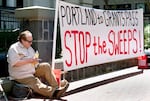
Jeff Liddicoat doesn’t like the term homeless — “I live outside,” he says, while attending an event held at Pioneer Courthouse in Portland, Ore., April 22, 2024.
Kristyna Wentz-Graff / OPB
Dozens of people gathered in downtown Portland Monday afternoon to protest a United States Supreme Court case that could reshape how cities across the country regulate unsheltered homelessness.
The case, Grants Pass v. Johnson, stems from a 2022 decision by an appeals court that ruled the city of Grants Pass could not issue citations to people sleeping outside if there was no shelter space available. The court said doing so was a violation of the Eighth Amendment, which forbids cruel and unusual punishment.
The city of Grants Pass appealed the decision, and the Supreme Court decided in January to hear the case.
Opening arguments began in Washington D.C. on Monday. Nearly 2,800 miles away, in Portland’s Pioneer Courthouse Square, protesters demanded that the court rule against the small Southern Oregon town in Josephine County.
They argued that siding with Grants Pass would effectively criminalize homelessness at a time when an increasing number of people were struggling.
“I’m prepared for bad news,” said Jeff Liddicoat, 64, who said he lives outside. Should the court rule in favor of Grants Pass, he said, “It does give municipalities a green light to become more restrictive.”
Protesters carried signs, chanted “house keys not handcuffs” and stood near a sign that said “STOP the SWEEPS!” in bright red letters. They handed out fliers and food. Many voiced concerns that the ruling would deepen the cycle of poverty, prompt sweeps in homeless encampments and cost taxpayers.
“This case and cases like it is that crowd of folks that want to put themselves up as being better than everybody else, take the opportunity to kick people while they’re down,” said Liddicoat. “And that’s just wrong.”
The Grants Pass case was in response to a 2018 decision in the 9th Circuit Court of Appeals, Martin v. Boise, which originally ruled that citing people for sleeping outside was cruel and unusual punishment. That decision has had far-reaching implications for cities and county governments in some western states on how they’re allowed to address public homelessness in their jurisdictions.
Related: Grants Pass v. Johnson: Here's what led to key homelessness case before high court
It comes as cities across the nation continue to grapple with mounting challenges related to homelessness in the pandemic’s wake.
In Oregon, skyrocketing housing costs, coupled with a fractured mental health system and the influx of the highly addictive opioid fentanyl, have made it even more difficult to help people find stability in their lives.
In Portland, the city’s first audit of its regional homeless response agency found that some shelters have year-long waitlists, are regularly at capacity and ineffective at moving people in shelters into permanent housing.
Meanwhile, Portland City Council is preparing to adopt new rules that would restrict types of camping on public property. While commissioners remain divided on how those rules will be enforced and adapted over time, they’re expected to hammer out the details Wednesday afternoon.
Related: Portland Commissioner Gonzalez wants tougher stance on homeless camping
Related: Hunnell Road: Forest Service had called on Bend to ‘reconsider’ camp removal, letter shows
Kaitlyn Dey, 27, an organizer with the Stop the Sweeps, a group that advocates for people who are unhoused, is concerned that the new rules and the latest Supreme Court Case “is going to have a significant impact on people who are just trying to survive living on the streets of Portland.”
She added: “We’re going to continue this legacy of criminalization instead of actually finding solutions.”
The Supreme Court is expected to announce its decision in late June.






